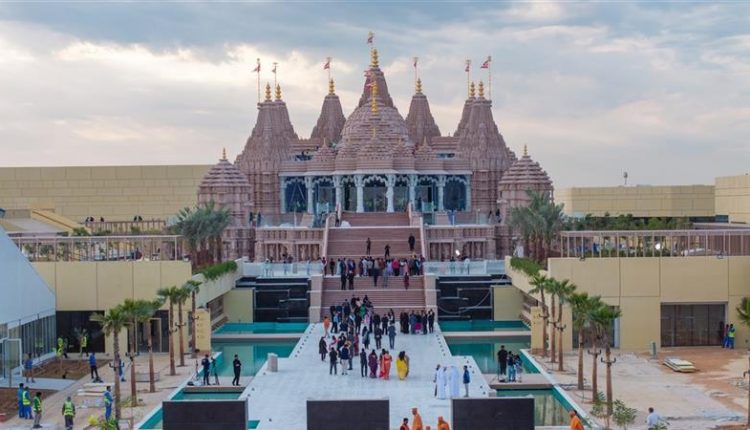Bhubaneswar: Prime Minister Narendra Modi left on a two-day visit to the United Arab Emirates (UAE) on Tuesday. He will be inaugurating UAE’s historic BAPS Swaminarayan Mandir in Abu Dhabi, the first Indian temple-style Hindu shrine in the Middle East, on Wednesday (February 14), besides meeting Bharat’s close strategic partners in West Asia.
“I am travelling to the United Arab Emirates on an Official Visit from 13-14 February and to Qatar from 14-15 February. This will be my seventh visit to the UAE and second visit to Qatar since 2014. …..During the visit, I will also inaugurate the first Hindu Mandir in Abu Dhabi. The BAPS temple will be an enduring tribute to the values of harmony, peace and tolerance, which both India and the UAE share,” the PM’s departure statement ahead of his visit to UAE and Qatar said.
The BAPS temple, spread over 27 acres atop a mound to the northeast of the UAE’s capital, is the first traditional ‘Hindu stone temple’ in the Middle East. The UAE government, through a royal decree, gifted 13.5 acres of land for the construction of the Hindu Mandire during PM Modi’s visit in 2015. Another 13.5 acres of land was allocated in 2019 during its Year of Tolerance.
THE TEMPLE
The 32.92 metres (108 feet) high, 79.86 metres (262 feet) long, and 54.86 metres (180 feet) wide temple at Abu Mureikhah, near Al Rahba along the Dubai-Abu Dhabi Sheikh Zayed Highway, has been constructed at a cost of Rs 700 crore.
The temple’s design draws inspiration from Vedic architecture and sculptures. Its facade includes intricate marble carvings set against a pink sandstone backdrop, crafted from more than 25,000 pieces of stone by artisans of northern Rajasthan. There are two Ghumats (domes), seven Shikhars (spires) that signify UAE’s seven emirates, 12 Samrans (dome-like structures) and 402 pillars. Each Shikhar has intricate carvings depicting stories from the Ramayana, Shiv Purana, Bhagavatam and Mahabharata as well as narratives of Lord Jagannath, Lord Swaminarayan, Lord Venkateshwara and Lord Ayyappa, according to news agency PTI.
The scenes from Ramayan are also engraved on the walls of the temple, including the one where Sabri feeds Lord Ram half-eaten berries and those of the 14-year exile of Lord Ram, Sita and Lakshman.
Camels, a representation of persistence, commitment, and endurance, have been carved into the sculptures to add a uniquely local touch, while “Dome of Harmony” serves as a unique portrayal of harmony of the five natural elements – earth, water, fire, air and space.
While the stones were brought from Bharatpur, the carvings on them were done in Bhilwara in Rajasthan.
There is also a large amphitheatre, prayer rooms, a gallery, a library, thematic gardens, water features, a food court, gift shop, children’s play area, a majlis, and two community halls that can accommodate 5,000 people on the temple complex.
“The idea germinated from our Guru Maharaj ji Sankalp in 1997, while he was touring the UAE. His devotees took him to the deserts of Sharjah and requested him to bless the land. He took off his shoes and said that a grand temple would be constructed in Abu Dhabi,” BAPS volunteer Ashwini told India Today TV.
This story is also depicted on the walls of the temple, he added.



Comments are closed.